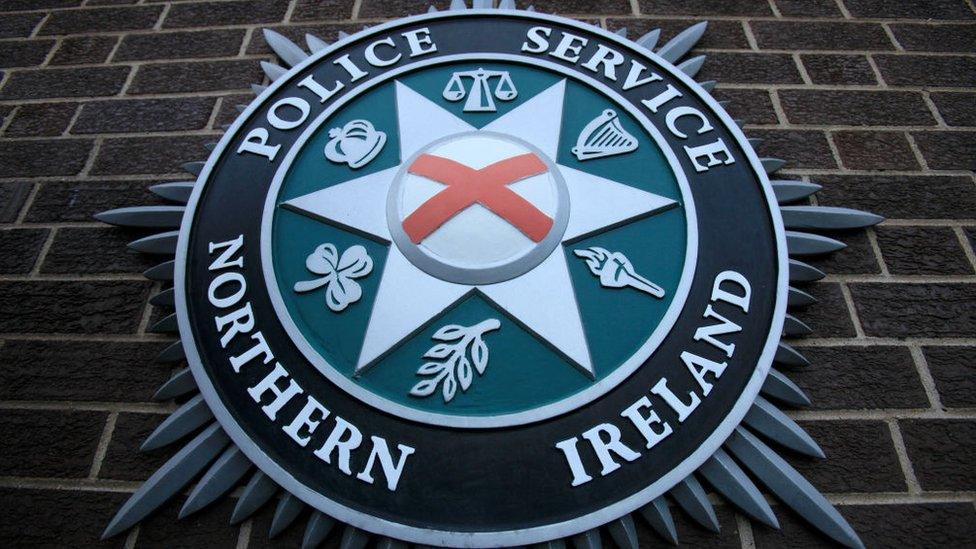PSNI: Suspending officers on full pay 'needs to be reviewed' says Naomi Long
- Published

Alliance leader Naomi Long served as Stormont's justice minister from January 2020 to October 2022
The practice of suspending police officers on full pay during misconduct inquiries should be reviewed, former justice minister Naomi Long has said.
She said there was "public frustration" over the length of time it can take for disciplinary processes to be completed.
But Ms Long added that changing the rules may require new legislation.
She was speaking a day after the PSNI confirmed it sacked nine officers last year for misconduct related to sexual or domestic abuse.
Figures released on Thursday also revealed a further 32 officers were currently suspended on suspicion of sexual misconduct.
Ms Long said the Police Service of Northern Ireland (PSNI) was "clearly taking robust action" when it was made aware of misconduct allegations against staff.
However, she added she shared the public's concern about the length of time it took for accused officers to be fully investigated, while receiving their full salary.
The Police Federation agreed that disciplinary processes "take too long to resolve" but said suspension "does not in itself imply any guilt or wrongdoing" and it would be a "travesty" to financially penalise officers who later cleared their names.
Police watchdog rules
Ms Long, who leads the Alliance Party, served as Stormont's justice minister from January 2020 to October 2022.
She said she raised concerns about PSNI disciplinary processes with the chief constable during her tenure.
"One of my frustrations was that whilst the police were taking the issue seriously, it often took a long time to reach conclusion and that added to public frustration," she told the BBC's Good Morning Ulster programme.
"There are a number of reasons why it takes so long. First of all, some of these issues don't simply go to the disciplinary [process] within police and professional standards.
"Some of them will emerge as part of ombudsman cases and there is an issue that until ombudsman reports are concluded that the police have been unable to take action.
Ms Long added she previously discussed the issue "in depth" with the Police Ombudsman for Northern Ireland as well as the PSNI.
"Obviously, in most of those cases that are serious, people will be suspended but they'll be suspended on full pay and I know that has been in the public domain and concerns around that," she said.
"It is something that I think does need to be looked at, but there is some change needed actually - potentially in legislation - to be able to allow that to happen and that's something that we were actively exploring."

Last July , BBC Spotlight revealed that two PSNI officers had been investigated for more than three years over allegations that they manipulated the body of a person who died by suicide in 2017 and shared photos and a video online.
At the time, it was revealed one of the officers had been suspended on full pay while the case was investigated by the Police Ombudsman.
On the wider issue of how the PSNI has handled allegations of domestic and sexual abuse within its own ranks, Ms Long said much training and investment had been done to challenge attitudes and change the organisation's culture.
"When you have organisations that are overwhelmingly male and that are very hierarchical in nature, there is a tendency for those organisations, whether consciously or unconsciously, to become sexist, misogynistic, " she said.
She pointed to examples of officers who were investigated for sharing pornographic material on their phones.
Ms Long said it was important such cases were taken seriously so the public could have confidence when reporting sexual or domestic abuse that the person investigating their complaint was not also a perpetrator of abuse.
Asked if she was concerned about the number of officers who had either been sacked or suspended over domestic or sexual abuse allegations, she said: "I think out of around 7,000 officers, it's a reasonable proportion and it probably doesn't reflect all of the problem.
"It will be those that have come to light within the PSNI, those that have been raised, so I see it as a serious problem where it exists.
"I think the numbers in some ways are just indicative of the size of the organisation, but I think [the fact] that it exists at all is something that I believe the police need to deal with."
'Patently unfair'
In a statement to BBC News NI, the Police Federation for Northern Ireland said it had "long held the view that disciplinary processes take too long to resolve" and it welcomed "recognition that things have got to change".
"Careers are put on 'hold' which means officers are unable to progress from their current positions, and that is patently unfair," it added.
In relation to suspension on full pay, the federation said the terms of suspension "stem from police regulations and are deemed a neutral act that forms part of the process".
"To penalise officers who are later retained in service, would be to financially sanction them when they may be later found to have done nothing wrong or be the subject of a minor misconduct sanction - that would be a travesty," the statement added.
Related topics
- Published19 January 2023

- Published7 July 2022

- Published3 February 2022

- Published15 April 2016
